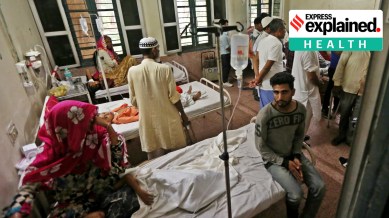Suspected diphtheria death in Punjab: What to know about the disease, its prevention
Diphtheria is a highly contagious but preventable bacterial disease. Here is what to know about reports of a recent case in Punjab and why spikes have been witnessed in the number of cases in some years

A three-year-old girl died of suspected diphtheria in Punjab’s Faridkot last week, in what may be the first case of the bacterial infection in the state this year.
Authorities said the child was not vaccinated against the preventable disease. According to a Punjab government report from August 2024, around 96% of children in the state were fully immunised. Here is what to know about the case and the disease.
monthly limit of free stories.
with an Express account.
What is the recent suspected diphtheria case from Punjab?
A girl from Basti Aawa, Ferozepur, fell sick on October 6 and displayed multiple symptoms associated with diphtheria. A physician referred her to the Guru Gobind Singh Medical College and Hospital (GGSMCH) in Faridkot. She passed away on October 8.
After the Ferozepur Civil Surgeon was informed about the incident, a survey exercise was carried out, with teams of the World Health Organisation (WHO) arriving. Health camps were organised in Basti Aawa and the nearby Basti Borianwali, having a total population of around 6,000. The parents and their two other children were reported to be healthy.
One child suspected of the disease in the area is undergoing treatment. Dr Meenakshi Dhingra, nodal officer of the health camp in Ferozepur district, said confirmation reports of both children are awaited from the Post Graduate Institute of Medical Education & Research, Chandigarh (PGIMER).
Symptoms, vaccination schedule of diphtheria
A toxin produced by some strains of the Corynebacterium diphtheria bacteria results in diphtheria. It affects the respiratory tract and spreads throughout the body. The common symptoms are fever, chills, swelling in lymph nodes, fatigue, shortness of breath, etc. It is also a highly contagious disease, although fatality rates are low.
Immunisation is the best prevention against it, with the full schedule requiring seven doses between 0-16 years. Three doses are given before the child turns one, a booster Diphtheria, Pertussis and Tetanus (DPT) shot when the child is two, a fifth dose when the child turns six, and one each in years 10 and 16.
According to a Rajya Sabha reply from Prataprao Jadhav, Minister of State in the Ministry of Health and Family Welfare, 93.5% of Indian children in the one-year age bracket were immunised in 2023-24. Punjab’s numbers stood at 93.96%.
Dr Balwinder Kaur, State Immunisation Officer of Punjab, said these numbers have risen. “By August 31 this year… fully immunised data of Punjab has reached 96%. These include children up to the age of 1 year who are immunised against polio, measles, rubella, tetanus, diphtheria, rotavirus, and other diseases up to the age of 1 year.”
Prevalence of diphtheria in recent years
Data from 2023-24 states that almost 84% of diphtheria cases in India were reported from 10 states — Kerala, Assam, Delhi, Gujarat, Haryana, Karnataka, Nagaland, Maharashtra, Rajasthan and West Bengal.
The WHO’s data portal showed 3,850 diphtheria cases reported from India in 2023; 3,286 in 2022 and 1,768 in 2021. There were 3,485 cases in 2020, and 9,622 and 8,688 cases in 2019 and 2018 respectively. In the past, the increase in cases has been mostly linked to unvaccinated children.
According to WHO, “Damaged health infrastructure and health services in countries experiencing or recovering from a natural disaster or conflict interrupt routine immunization.” Vaccine hesitancy among a community can also be a major factor.
In Ferozepur, health camps have checked the immunisation status of people in the slums. The deceased child’s parents and close contacts have been immunised irrespective of their age, Dr Dhingra said. For Punjab, one major challenge is to ensure the incoming migrant population, from states like Uttar Pradesh and Bihar, has been inoculated as well.